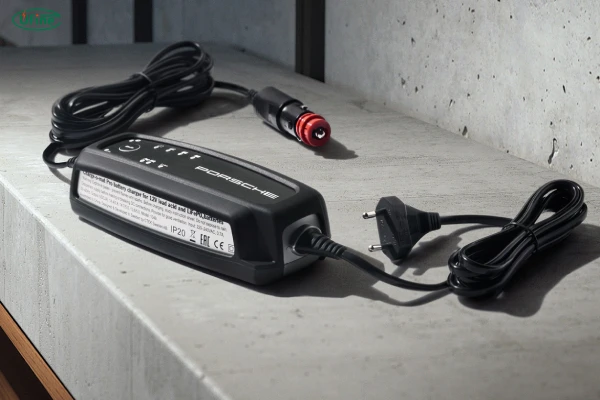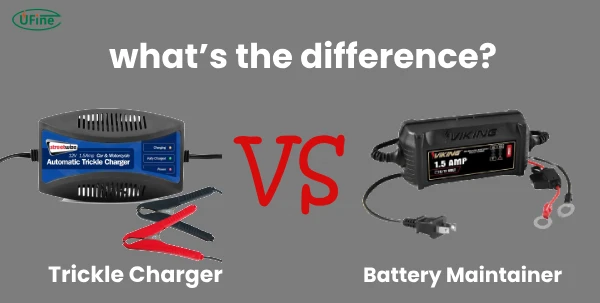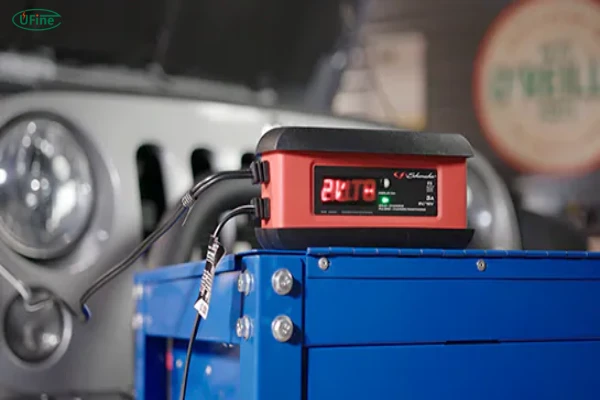When batteries sit idle for long periods, they gradually lose their charge, leading to reduced performance and lifespan. This is where a battery maintainer comes into play. Whether for cars, motorcycles, RVs, boats, or solar systems, a battery maintainer can keep your battery at an optimal charge level without overcharging it. But how does it work, and is it different from a trickle charger? Let’s dive into the details.
Part 1. Learn battery maintainer
A battery maintainer is a smart device that keeps your battery fully charged without causing overcharging. Unlike traditional battery chargers, a maintainer only supplies power when needed and automatically stops when the battery is at its full capacity. This feature makes it ideal for long-term storage and maintaining battery health.
There are different types of battery maintainers available, depending on the application:
Lithium Battery Maintainer
Lithium batteries require specialized maintainers that are designed to handle their unique charging characteristics. A lithium battery maintainer ensures your battery remains at the correct voltage without the risk of overcharging, which can be dangerous for lithium-based cells.
Solar Battery Maintainer
A solar battery maintainer uses sunlight to keep your battery charged. It’s an excellent option for off-grid applications, RVs, boats, and other vehicles that are stored outdoors. These maintainers trickle-charge the battery using solar energy, preventing it from draining completely.
Car Battery Maintainer
A car battery maintainer is perfect for vehicles that sit unused for extended periods, such as classic cars, motorcycles, and seasonal vehicles. It ensures that the battery stays in peak condition, so you don’t end up with a dead battery when you need to start your car.
Part 2. Advantages and disadvantages of battery maintainers
Pros
✅ Prevents battery discharge during storage
✅ Extends battery life by maintaining a healthy charge level
✅ Smart charging technology prevents overcharging
✅ Safe for long-term use without supervision
✅ Saves money by reducing battery replacements
Cons
❌ Not designed to charge a completely dead battery
❌ Some models may not be compatible with all battery types
❌ Requires access to a power source (except for solar maintainers)
Part 3. Battery charger vs. battery maintainer: what’s the difference?
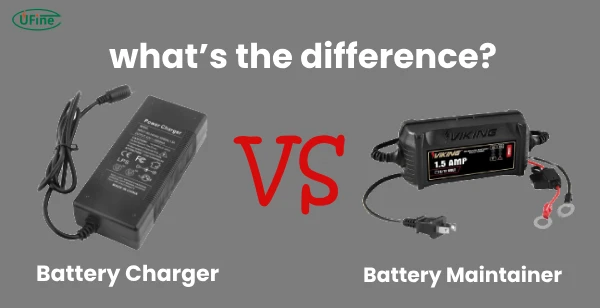
A battery charger is designed to charge a depleted battery from a low voltage to full capacity. It applies a constant current until the battery is fully charged.
A battery maintainer, on the other hand, is meant to keep an already charged battery at its optimal level. It only delivers power when needed and automatically stops charging when the battery reaches full capacity.
If your battery is completely dead, you’ll need a charger before switching to a maintainer.
Part 4. Battery maintainer vs. trickle charger: what’s the difference?
A trickle charger provides a constant low current to the battery, regardless of its charge level. This can lead to overcharging if left plugged in for too long.
A battery maintainer, however, uses smart technology to monitor the battery’s charge level and only charges when necessary. This makes maintainers the safer and more efficient choice for long-term storage.
Part 5. When should you use a battery maintainer?
You should use a battery maintainer if:
- You store a vehicle or equipment for weeks or months at a time
- You want to extend battery life and avoid frequent replacements
- You own a seasonal vehicle like a motorcycle, boat, or RV
- You need a hassle-free way to keep your battery healthy
Part 6. How to choose a battery maintainer?
When selecting a battery maintainer, consider the following factors:
Battery Type Compatibility – Ensure the maintainer supports lead-acid, AGM, gel, or lithium batteries depending on your needs.
Automatic Shutoff – Choose a maintainer with smart charging to prevent overcharging.
Power Source – Decide between a plug-in maintainer or a solar-powered option based on where you will use it.
Safety Features – Look for reverse polarity protection, short-circuit protection, and overcharge prevention.
Amperage Output – Most maintainers supply between 0.5 and 2 amps, which is ideal for maintenance but not for full charging.
Part 7. Are battery maintainers good for batteries?
Yes! A battery maintainer prevents self-discharge and ensures your battery stays healthy even during long storage periods. It reduces sulfation (a common cause of battery failure) and extends battery life by keeping it in an optimal charge range.
Part 8. Is it safe to keep a battery maintainer on?
Yes, as long as you use a smart battery maintainer with automatic shutoff features. These devices only deliver charge when needed, preventing overheating and overcharging. However, always follow the manufacturer’s instructions for safe usage.
Part 9. Does a battery maintainer charge a dead battery?
No, a battery maintainer is not designed to revive a dead battery. If your battery is fully discharged, you will need a regular battery charger first. Once the battery reaches a proper voltage, you can switch to a maintainer to keep it charged.
Part 10. Final thoughts: do you need a battery maintainer?
If you have a vehicle or battery-powered equipment that sits idle for extended periods, investing in a battery maintainer is a smart decision. It ensures your battery stays in peak condition, extends its lifespan, and saves you from unexpected dead batteries.
Part 11. FAQs
1. Can I use a battery maintainer on any type of battery?
Most maintainers support lead-acid, AGM, gel, and lithium batteries, but always check the specifications before purchasing.
2. How long can I leave a battery maintainer on?
Smart battery maintainers can be left on indefinitely, as they only charge when necessary.
3. Can I use a battery maintainer outdoors?
Some models are weatherproof, but if not, you should use a protective cover or store the battery in a sheltered area.
4. Will a battery maintainer drain my battery if unplugged?
No, a quality battery maintainer will not drain your battery when unplugged, but it’s always a good idea to disconnect it if not in use.
5. Can I use a battery maintainer on my motorcycle?
Yes! Battery maintainers are great for motorcycles, ATVs, and boats, especially during off-seasons.
6. Do battery maintainers work with deep-cycle batteries?
Yes, as long as they are compatible with deep-cycle battery types.
7. What’s the difference between a battery maintainer and a float charger?
A float charger constantly delivers a low charge, while a battery maintainer monitors the charge level and only supplies power when needed.
8. Will a battery maintainer work on a hybrid or electric vehicle?
Most maintainers are designed for 12V lead-acid batteries and may not be suitable for high-voltage EV batteries.
9. Does a battery maintainer prevent battery sulfation?
Yes, by keeping the battery at an optimal charge level, a maintainer helps reduce sulfation, which is a major cause of battery failure.
10. Are battery maintainers expensive?
Battery maintainers range from $20 to $100, depending on features and compatibility. Investing in a good one can save you money on battery replacements.
Related Tags:
More Articles
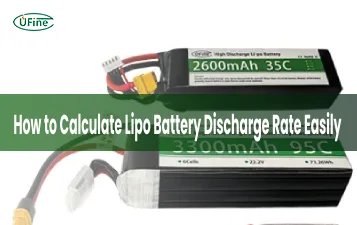
LiPo Battery Discharge Rate Guide & Calculation Tips
Understand LiPo battery discharge rates, C-ratings, and how to calculate max current. Essential guide for RC, drones, and electronics users.
High‑Capacity 3S LiPo Batteries: 5000 mAh vs. 10000 mAh
Compare 3S LiPo 5000mAh vs 10000mAh batteries by weight, power, and use. Find the best fit for your drone, RC car, or boat setup.
Top 5 Applications for Small 3S LiPo Batteries
Small 3S LiPo batteries power drones, RC gear, wearables, and robotics with high energy and low weight. Making them ideal for compact electronics projects.
Building and Charging Your Own 3S LiPo Pack: A Step‑by‑Step Guide
Learn how to build, balance, and charge a 3S LiPo battery pack safely at home with this complete DIY guide for hobbyists and beginners.
How to Choose the Right LiPo Battery Plug Type?
Discover the best LiPo battery plug types, how to choose them, and expert tips for safe usage, soldering, and maintenance.
